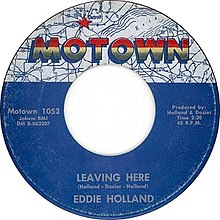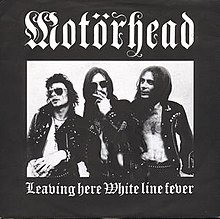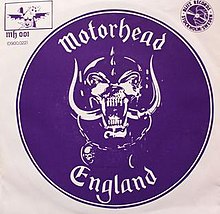Leaving Here (Motörhead song)
| "Leaving Here" | ||||
|---|---|---|---|---|
 |
||||
| Single by Eddie Holland | ||||
| B-side | "Brenda" | |||
| Released | December 19, 1963 | |||
| Format | 7" single | |||
| Recorded | November 26, 1963 | |||
| Genre | R&B | |||
| Label | Motown 1052 | |||
| Songwriter(s) | Holland–Dozier–Holland | |||
| Eddie Holland singles chronology | ||||
|
||||
| "Leaving Here" | ||||
|---|---|---|---|---|
 |
||||
| Single by Motörhead | ||||
| B-side | "White Line Fever" | |||
| Released | 1977 | |||
| Format | 7" | |||
| Recorded | Peeble Beach Studio, Worthing, England 1977 |
|||
| Genre | Hard rock | |||
| Length | 3:20 | |||
| Label | Stiff Records | |||
| Songwriter(s) | Holland–Dozier–Holland | |||
| Motörhead singles chronology | ||||
|
||||
| Alternative cover | ||||

1977 Blitz Records (Sweden) release
|
||||
"Leaving Here" is a song written in 1963 by Motown songwriters Holland–Dozier–Holland. Written at the beginning of the partnership, it is notable in several recordings. It was originally released as a single in December 1963 by H-D-H lyricist Eddie Holland and peaked at number 76 on the Billboard Hot 100 and at number 27 on the Billboard R&B chart.
The original recording has subsequently been released on compilation albums such as Heaven Must Have Sent You: Holland/Dozier/Holland Story, released in 2005, and The Complete Motown Singles Vol.3 (1963), released in 2006. As of 2016, the only CD to find the track in stereo is "A Collection of 16 Big Hits, Vol. 2" on Motown MOTD-5449.
The song was the debut single from the English hard rock group Motörhead, released in 1977. Despite it being their first single, only the band's founder Lemmy remained from the band's original line-up.
On April 28, 1979, Lemmy was interviewed by John Tobler on BBC Radio 1's Rock on Saturday show, and "Motorhead", "Leaving Here" and "Limb from Limb" were played.
The recording was inspired by the Birds' 1965 cover version of Eddie Holland's "Leaving Here". Lemmy was a great fan of the band.
Motorhead had originally recorded a version of this song for their debut album On Parole, but unsure of its commercial viability their record company United Artists, to whom they were still under contract, were refusing to issue it. Jake Riviera of Stiff Records, a casual acquaintance of Lemmy's, offered to release a new single from the band. No official deals were made, the band paid for the studio time whilst Riviera paid all other expenses. The single was scheduled for release with catalogue number BUY9 when United Artists intervened forcing Stiff to shelve its distribution.
...
Wikipedia
